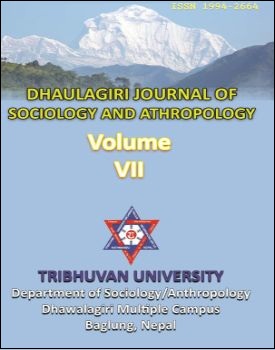Locating Pawai in the Social Hierarchy of the Khasa: a Preliminary Note on Jumli Caste Structure
DOI:
https://doi.org/10.3126/dsaj.v7i0.10436Keywords:
Pawai and Jyulel, caste hierarchy, deprivation and identityAbstract
Until very recently, Jumla’s Pawai, or the Matawali Chhetri, have remained one of the very least understood caste groups in Nepal. In many sense Pawai can be considered as an unusual caste group and possess some unique yet paradoxical socio-cultural traits and claims. Overall, they represent Chhetri sub-caste, but in the Jumli caste hierarchy they are placed lower than Chhetri. They do not wear sacred thread called “janai,” do mostly worship masto, and in Bota village, some of them even offer liquor to their Hindu diety. This article attempts to explain the distinctive characteristics of Pawai in light of the Jumli caste hierarchy, and differs from some of the simplistic explanations of human ecological approach to argue that Pawai are simply the by-product of their cultural interface with the local ecology, or the reductionist arguments of identity politics that it is the ethnicity and not the class that differentiates society and forms different identity of the culturally marginalised one. This article first sheds lights on the social construction of Pawai as the kamsel caste group, takes into account the uniqueness of paddy cultivation in Jumla and its caste implications in the local political economy, and then compares and contracts the Pawai vis-a-vis the Jyulel to make an argument that the uniqueness of Pawai can only be meaningfully understood by placing them in their dynamic relationship with Jyulel. This relationship essentially entails a relationship of privilege and deprivation in terms of access to and ownership of jyula (as productive low lands). By implication, it is differential access to assets and resources that brings diversity and inequality in society and not the vice-versa.
DOI: http://dx.doi.org/10.3126/dsaj.v7i0.10436
Dhaulagiri Journal of Sociology and Anthropology Vol. 7, 2013; 31-50




